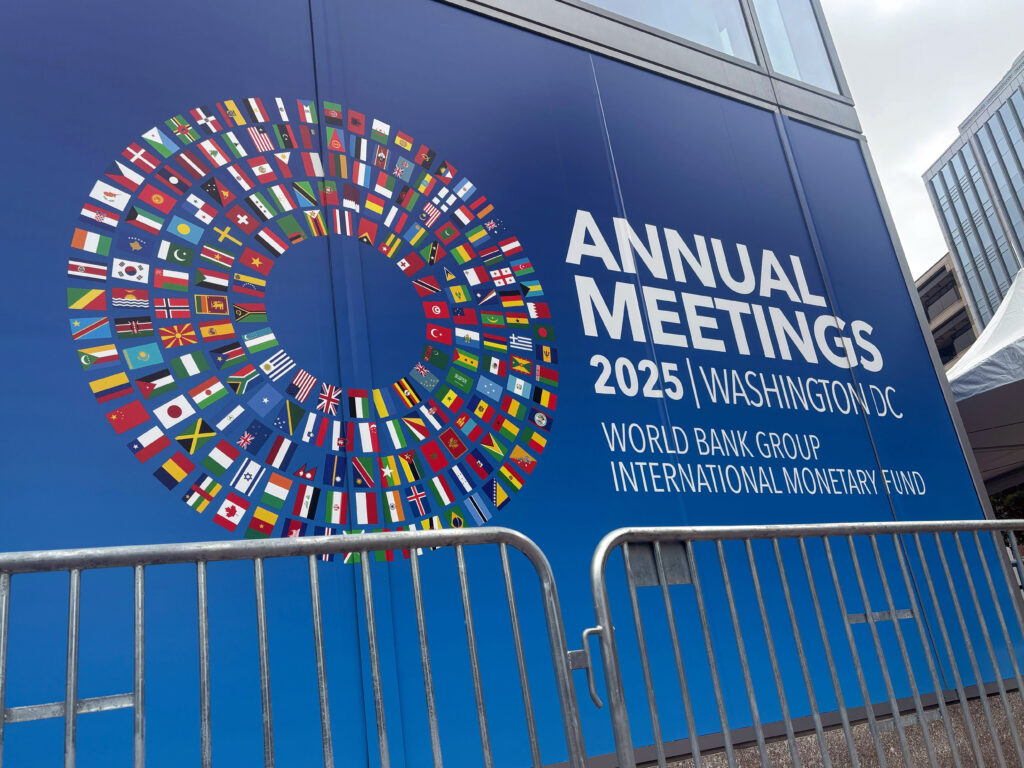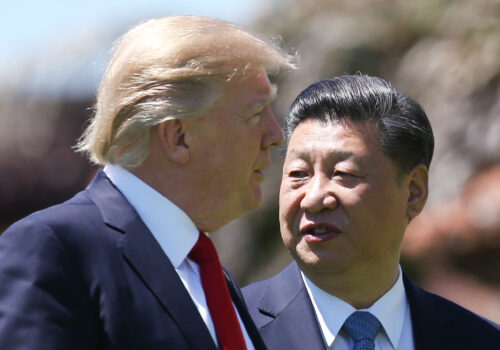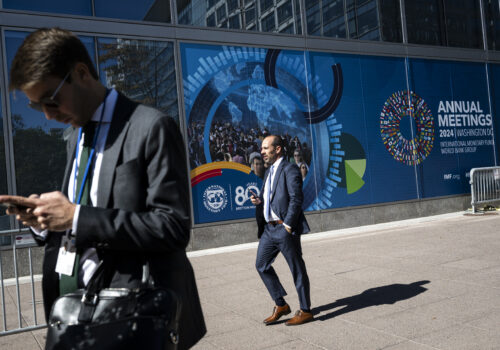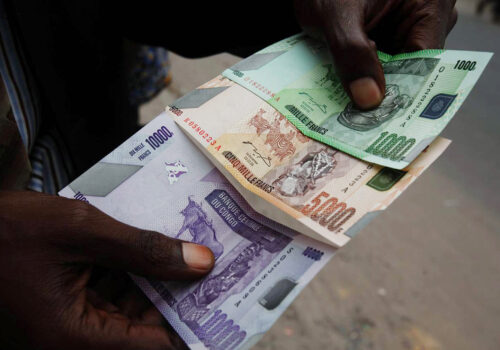Once again, the International Monetary Fund (IMF) and World Bank Annual Meetings will unfold against a turbulent global backdrop. In their speeches and prepared statements, delegates will raise concerns about the global economic outlook, fret about rising fiscal deficits and hidden risks in private equity and crypto markets, and make the case for their own policy efforts in front of the global community. A joint communiqué is unlikely, in part because both the United States and China will not agree to language aimed at reining in their isolationist or mercantilist tendencies for the benefit of the rest of the world.
But this is not what observers should focus on most this week. Instead, it’s worth closely watching for a hint of what is happening behind closed doors. There, conversations will focus on the few areas for which the two institutions still enjoy the support of their major shareholders—not the least because the IMF’s and World Bank’s considerable financial resources look ever more appealing to finance ministers who are running out of fiscal space at home.
The United States and the IMF
To begin with, most delegations will be keenly interested in Washington’s relationship with the Bretton Woods twins. US Treasury Secretary Scott Bessent signaled support for the institutions at the spring meetings this year, recently firmed up by the US intervention in the Argentine peso. But while policymakers may talk of partnership, the power asymmetry within the IMF remains evident.
There is a possible upside to greater US engagement—including improved cooperation on major lending cases and a push for the IMF to strengthen its surveillance arm, a core mandate much neglected in recent years. Similarly, the United States could collaborate with the two Bretton Woods institutions to ensure that countries meet their loan conditions, enabling timely repayment. The administration might even convince Congress to ratify the 2023 quota increase, shifting the fund’s finances to a more permanent capital base.
But there is also a risk. Already reeling from the dissolution of the US Agency for International Development, many delegates are bracing for US demands to cut climate and, perhaps, development programs at the IMF and World Bank, which could lead to substantial friction with emerging market and developing countries. Moreover, there are concerns that the United States could politicize both lenders’ loan operations, exposing all shareholders to the risks of misconstrued lending programs.
China’s position in the IMF
It will also be interesting to see how China’s position vis-à-vis the Bretton Woods institutions is evolving. The IMF has begun to take a firmer line on China by pointing at a significant exchange rate depreciation ahead of the annual meetings, and it has also published a paper on the hidden costs of China’s industrial policies. This introduces some overdue realism to the IMF’s analysis, but the question is how China will react if it senses a major shift in the previously benign analytical work of the institution.
Beijing is unlikely to complain about this openly, but its frustration with stalled governance reform—including a freeze on quota shares, limiting China’s voting power—will continue to simmer beneath the surface. It may feel vindicated by further building up its alternative lending framework (consisting of project loans and renminbi swap lines), and it may take a hard line on debtor countries with dollar or euro obligations. Both institutions will need to resort to skillful shareholder diplomacy while preserving their analytical integrity.
Lending to Argentina and Ukraine
IMF shareholders may also be concerned about recent developments in Argentina. The government is caught between a possible resurgence of inflation and weak growth prospects, as long as the ruling coalition lacks a strong congressional majority. In the case of political dysfunction, Argentina may eventually fail to service its growing multilateral and US debt burden, which could complicate the IMF’s position as a senior creditor if worse comes to worst.
Ukraine represents a different but equally complex test. Even as military support continues, the budgetary gap into next year is becoming more visible. Continuing the lending program will require additional financing assurances, a discussion that is linked to the legally fraught use of frozen Russian assets. Otherwise, the countries that formed the Group of Creditors to Ukraine in 2023 to facilitate the program may eventually be on the hook for additional contributions to help Ukraine repay the IMF.
Internal dynamics and reform
And then there is the question of internal reform. Both institutions face staff and budget pressures but are under renewed scrutiny to deliver measurable results in an era of rising skepticism toward multilateralism. The World Bank has already announced a reorganization of some functions across its different lending arms, and the IMF, whose staff has grown over the last five years, will likely come under pressure to unwind the recent buildup in non-core functions.
To sum up, expect few major announcements this week. There will be important closed-door meetings, however, that are likely to set the course for the Bretton Woods institutions for the next few years.
Martin Mühleisen is a nonresident senior fellow at the Atlantic Council’s GeoEconomics Center and a former IMF official with decades of experience in crisis management and financial diplomacy.
Further reading
Sun, Oct 12, 2025
As the trade war resumes, China may be keeping one eye on Trump and one on the Supreme Court
New Atlanticist By Josh Lipsky
The US president’s leverage with Xi Jinping could be undercut by the Supreme Court's deliberations.
Wed, Oct 8, 2025
From US tariffs to Argentina’s crisis: The five important issues at next week’s IMF-World Bank Annual Meetings
Econographics By Hung Tran
The IMF and the World Bank will face five important issues, which span both near-term economic prospects and more fundamental, longer-term challenges confronting the global economy.
Tue, Oct 7, 2025
How a weaker US dollar can help debt-burdened African countries
New Atlanticist By Bart Piasecki
Trump’s drive to weaken the US dollar is having global side effects. For some African countries, it is helping to ease immediate fiscal pressures.
Image: The IMF-World Bank Annual Meetings kick off in Washington, DC on October 13, 2025. Photo by Katherine Golden/Atlantic Council.



